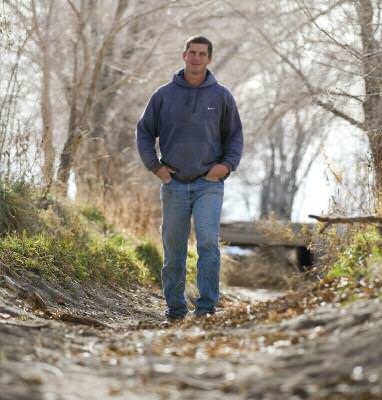edible garden
LIFE SUPPORT
Learn the importance of testing your soil.
WRITTEN BY ERIN MEYERING
PHOTOS BY ASA GILMORE
There are about 50 billion microbes in just one tablespoon of soil. There’s no doubt about it, your soil is alive, and you should probably treat it as such.
“I have this new respect for the hidden life in soil,” Kristin Ohlson said in a talk about her book, The Soil Will Save Us, at Sundance Books and Music in Reno this July.
Testing your soil, whether you’re using it for major agricultural production or just a personal herb garden, is key to its nourishment and ability to thrive.
Know your soil
Soil health can vary significantly from one area to another. Your soil can be affected by its past management and environmental history, among other factors.
“In our area, soils can be different from home to home,” says Wendy Hanson Mazet, master gardener program coordinator for the University of Nevada Cooperative Extension.
Each expanse — from your front yard with its store-bought bagged soil to the native soil you may have in your backyard — may require different maintenance. But first, you’ll need to test the soil to determine its needs.
You may either have a professional conduct a comprehensive soil test, which usually costs $50 to $70, or buy a simple test (which costs about $10) and try it on your own.
If you do it yourself, be sure to test different sections where its color and texture may vary.
What to test
According to David Ruf, owner of Greenhouse Garden Center in Carson City, when conducting your soil test, the top four items you’ll want to analyze are:
• pH level: Testing for pH tells you whether your soil is alkali or acidic, and how to counteract its pH to work toward neutrality. Different plants thrive in soil with various pH levels (generally neutral to acidic).
• Nitrogen content: The nitrogen content in soil is responsible for lush and rapid plant growth.
• Phosphorus content: Monitoring phosphorus in soil is important because it regulates protein synthesis, can create stronger roots, and affects winter hardiness.
• Potash content: Balanced potash content is crucial to a plant’s nutrient maintenance and growth. Applied fertilizers and manures maintain adequate potash in the soil.
Having healthy soil and taking the time to balance its contents allow for growth of bigger, stronger-rooted plants that produce more fruit and flowers.
“Testing your soil is a health checkup to let you know which [soil treatment] path to go down,” Ruf says.
Erin Meyering, a staff writer for edible Reno-Tahoe, enjoyed growing up watching her mother garden. Having healthy soil helped create healthy, fresh produce from the garden. She believes people never get too old to play in the dirt.
Resources
Garden Shop Nursery
3636 Mayberry Drive, Reno
775-322-8733, http://www.Gardenshopnursery.com
Greenhouse Garden Center
2450 S. Curry St., Carson City
775-882-8600, http://www.Greenhousegardencenter.com
Master Gardener Program at the University of Nevada Cooperative Extension
Free, research-based horticulture information
USDA Natural Resources Conservation Service in Nevada
A leading voice of soil management in the area
Nevada Analytical Services
855 Mill St., Ste. 2B, Reno
775-284-3970, http://www.Nevadaanalytical.com
Dig It! The Secrets of Soil
In this exhibit, journey into the skin of the earth to discover the amazing world of soils.
The California Museum, Sacramento, through March 29, 2015
http://www.Californiamuseum.org
The Soil Will Save Us by Kristin Ohlson
Available at Sundance Books and Music
121 California Ave., Reno
775-786-1188, http://www.Sundancebookstore.com


